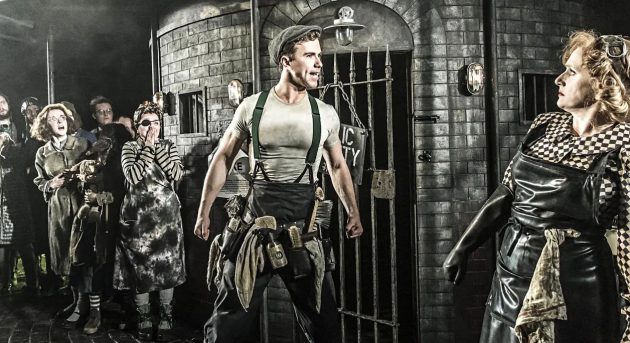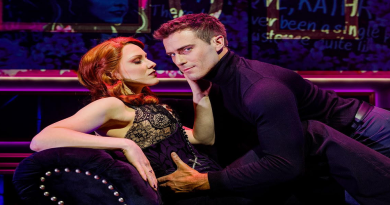Urinetown is a wee bit close to reality
Robert de Niro, in his role as Al Capone in the 1987 blockbuster The Untouchables, said: “We laugh because it’s funny and we laugh because it’s true”. The character was referring to the seemingly ludicrous idea that the mob had taken control of myriad aspects of Chicago, including the infiltration of legitimate institutions. But the words could just as easily apply to the fictional setting of Urinetown as the streets of the Windy City.
Irreverent and intelligent, the dystopian Urinetown made its debut on 6 May 2001. This anarchic “issues musical” went on to enjoy great success: three Tony Awards and Outer Critics Circle Awards, two Lucille Lortel Awards plus a pair of Obie Awards – so the show has earned its stripes. With a book by Greg Kotis, music by Mark Hollmann, and lyrics by the pair of them, Urinetown is a satirical comedy that shines the spotlight on legal injustices and corporate greed, with laughs thrown in to take the edge off. While set in the near future, audiences will be uncomfortably familiar with gritty realities enacted on stage, making them feel disturbingly contemporary.
The plot of Urinetown pivots around a water shortage, wrought by a twenty-year drought – a not-so-subtle allusion to climate change. Consequently, paid public toilets are introduced by the Urine Good Company, with corporate tyrant Caldwell B Cladwell at the helm. Should the poor disobey the law against peeing for free, the result is banishment to the mythical Urinetown.
As in all desperate situations, those on the receiving end of harsh rules and laws eventually reach breaking point. Currently, this is evident in a wave of strike action and union involvement. In Urinetown, this revolutionary spirit is manifest in the character of Bobby Strong, who endorses the right to pee ‘wherever you like, for as long as you like, and with whomever you like’. And while the musical is melodramatic in the sense that privatisation of the human body is a bit of a stretch, the exploitation of human rights, increased commodification, and nonsensical abuse of bureaucratic power are ubiquitous in modern life.
Much of Urinetown depends on the audience’s recognition of references, such as the opening scene – the rebellious rendition of ‘It’s a Privilege to Pee’ a parodic imitation of the opening of Les Miserables. The show is thoroughly postmodern, refusing to allow audiences to suspend their disbelief: ‘This may not be a happy musical … but it’s still a musical’. Reality is ever-present, whether through the breaking of the fourth wall or ironic use of song (as with ‘It’s a Privilege to Pee’). The grittiness is not surprising in a musical inspired by the pioneer of ‘Political Theatre’, Bertolt Brecht. Known for strategies such as harsh lighting, actors summarising events, and captions, Brechtian drama is the ideal vehicle for portraying the world as it actually is. Comforting escapism this is not, despite self-aware, self-mocking humor.
In the spirit of realism, the names of the characters are clues to their roles: Little Sally, co-narrator of Urinetown alongside Officer Lockstock, is one of the ‘little’ people who are forced to save their pennies in order to use the Amenities (‘Four hundred and ninety-seven. Just a few more. Penny for a pee, sir?’). Other characters, like Hope, have names that are deeply ironic. Arts columnist Norman Lebrecht described musicals like Urinetown as ‘entertainment which has found relevance … with twenty-first concepts of irony and alienation’. He was referring, in 2005, to the increasing presence of the Ironic Detachment musical (as opposed to Emotional Attachment), as represented in shows like Hair, Guys & Dolls, and Threepenny Opera. Musical theatre aficionado Scott Miller comments on the cultural relevance of this, saying that for decades ‘[o]ur whole culture has been heading in the direction of Ironic Detachment, not just musicals’. This rings true, and depressingly so – irony, it has been said, is the ethos of our age.
The opposite of irony is good old-fashioned sincerity, without which we find ourselves sinking into a quagmire of cynicism, disingenuousness and fragmentation. The Cladwells of this world win out. Hope is snuffed. The powerless are crushed. So, do laugh along with the self-mockery of Urinetown – but ask the questions it encourages us to ask. . . because its themes are now a wee bit too real.




